This weekend I leave for the snowy mountains of Utah to go skiing. It is our annual family reunion, and there has not been a year yet where someone hasn't ended up in the medical clinic. From just bumps and bruises to broken collarbones and torn ACL's, the injuries have been mild to severe. However, this is the risk that is taken when you decide to plungehead first down an ice covered mountain on a piece of fiberglass strapped to your feet. Eventually, despite the greatest of skill, something is going to go wrong.
What is interesting is that on a daily basis individuals jump into the financial markets with their "savings" in the hope of a thrilling ride. However, very much like skiing, inevitably you are going to take a tumble. Importantly, that "tumble" generally occurs when one becomes overly confident in their abilities and pushes the "risk" just beyond their inherent capabilities to react quickly enough. The result has tended to not be a pretty one.
As I discussed earlier this week, there are many signs that suggest the current market environment has begun to push the outer boundaries of the "risk" curve. While this doesn't mean that the markets are about to "crash," it does suggest that individuals with a lesser skill set may want to be a bit more cautious.
The following is a list of reading I will be doing while, hopefully, sipping coffee between monumental runs rather than in the medical facility nursing an injury. I know my limits, and the "fear" of falling keeps me from going over my skis.
1) Business Deaths Are Killing Job Growth by Jon Clifton via Gallup
"One of the main reasons that the jobs situation has yet to recover is that, according to the U.S. Census, the number of business deaths now exceeds the number of business births among employer firms for the first time since 1977, when this measurement began."
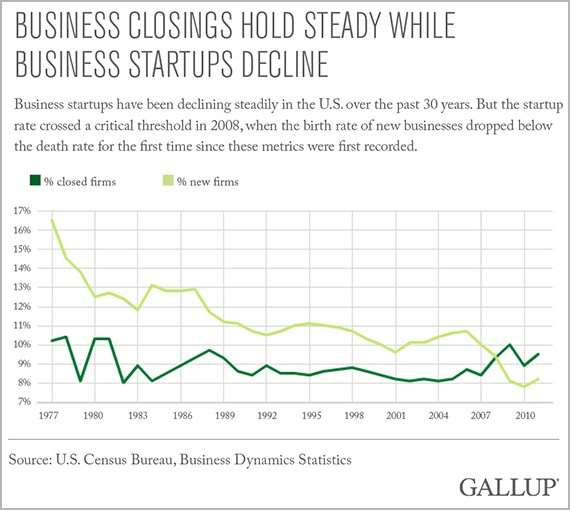
"Creating good jobs and subsequently rebuilding America's middle class hinges on the success and failure of small businesses and startups. Existing small businesses are experiencing headwinds caused primarily by challenging business realities, the overall economy and a concern about government regulations."
In The "I Told You So" Column: Challenger Job Cuts Surge As Lower Oil Fails To Result In Spending via ZeroHedge
Also Read: Census Bureau Was Fudging Jobs Data by John Crudele via NY Post
Another Take: Jennifer Aniston's Love Life Explains Unemployment Calc by John Tamny via RCM
2) On My Radar Equity Valuations, Recessions & Market Declines by Steve Blumenthal via Advisor Perspectives
"Global QE is running out of runway. Debt has increased, not decreased. Twenty countries have cut interest rates in 2015. It is an all-out global race to debase. Today let’s take a look at the hard evidence signaling slowdown. My personal view is that slowdown would not be as much of a problem if valuation measures were low. They’re not: by just about every measure the market is overpriced, overbought and over believed.
Last week I had a fascinating conversation with Neile Wolfe of Wells Fargo Advisors, LLC. Based on the underlying data in the chart above, Neile made some cogent observations about the historical relationships between equity valuations, recessions and market prices:
- High valuations lead to large stock market declines during recessions.
- During secular bull markets, modest overvaluation does not produce large stock market declines.
- During secular bear markets, modest overvaluation still produces large stock market declines.
Here is a table that highlights some of the key points. The rows are sorted by the valuation column."
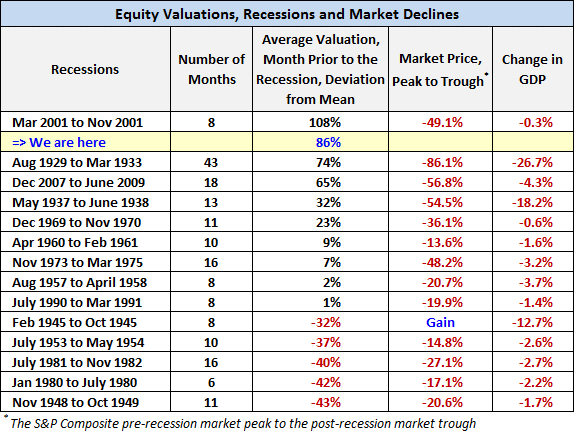
Read Also: Corporate Buybacks At Record Levels by Matthew Kerkhoff via Financial Sense
And More: Bull Market In Stock Buybacks by Ed Yardeni
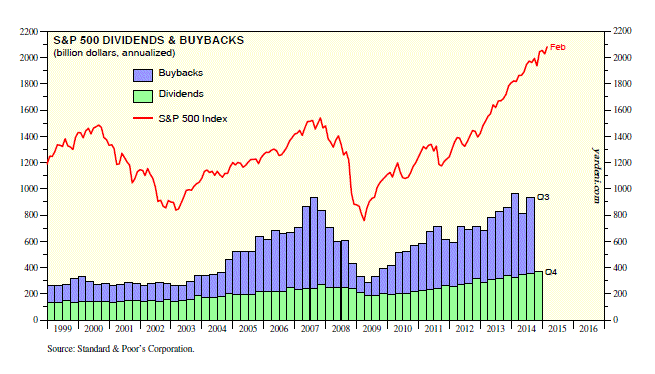
But Also: US Equity Valuations To Be Dismissed? by BCA Research
3) Investors May Have Jumped On The Wrong Boat by GaveKal Research
I noted in yesterday's "3 Things" that the net percentage of investment managers long Eurozone related stocks was at an all time high. GaveKal has a great piece explaining why this may just turn out to be a very bad idea.
"All of this would seem to lend support to the relationship we showed between ECB asset purchases and stock performance a while back-- namely that MSCI Europe looks vulnerable to a 35% decline from current levels."
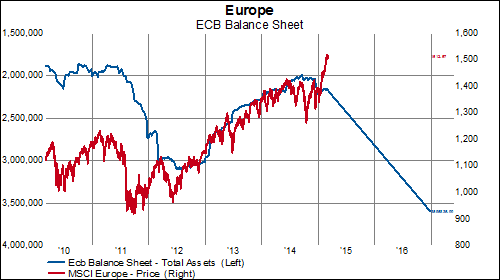
Opposing View: The Compelling Case For European Stocks by John Kimelman via Barron's
Read Also: Why Weak Data And Earnings Don't Matter...Yet by Charlie Bilello via Pension Partners
4) Why This Tech Mania Is Worse Than 2000 by Mark Cuban via Business Insider
"For those who can't figure out how to be Angels. You can sign up to be part of the new excitement called . Equity Crowd Funding allows you to join the masses to chase investments with as little as 5k dollars. Oh the possibilities!
I have absolutely no doubt in my mind that most of these individual Angels and crowdfunders are underwater in their investments. Absolutely none. I say most. The percentage could be higher.
Why? Because there is ZERO liquidity for any of those investments. None. Zero. Zip."
But Also Read: Cuban Is Wrong by Cullen Roche via Market Watch
5) Ready To Retire? Probably Not by Kelly Hollan via CNBC
"A stabilizing retirement age is a problem because workers today have, on average, saved far too little to insure a comfortable retirement. Average 401(k) balances at Fidelity were $91,300 in 2014, but the firm also estimated that a 65-year-old couple retiring that year would spend an average of $220,000 during retirement on out-of-pocket health care costs alone."
Read Also: Invest Or Save More? by Noah Smith
Read Also: Lightening Generally Strikes Just Once by Ben Carlson via Wealth Of Common Sense
Chart Of The Day: Screw It I'm All In by Barry Ritholtz via The Big Picture
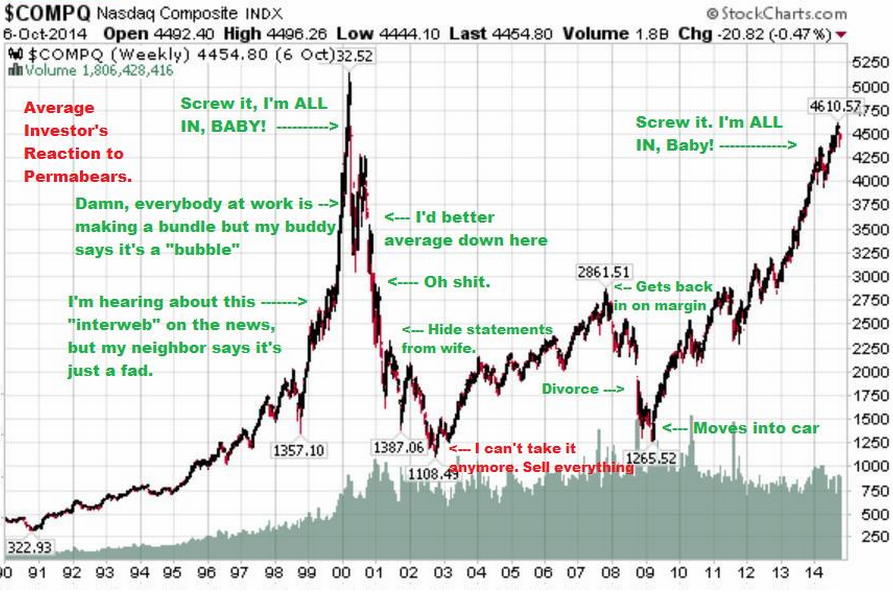
"The trick is to stop thinking of it as YOUR money." - IRS Auditor
Which stock should you buy in your very next trade?
With valuations skyrocketing in 2024, many investors are uneasy putting more money into stocks. Unsure where to invest next? Get access to our proven portfolios and discover high-potential opportunities.
In 2024 alone, ProPicks AI identified 2 stocks that surged over 150%, 4 additional stocks that leaped over 30%, and 3 more that climbed over 25%. That's an impressive track record.
With portfolios tailored for Dow stocks, S&P stocks, Tech stocks, and Mid Cap stocks, you can explore various wealth-building strategies.
